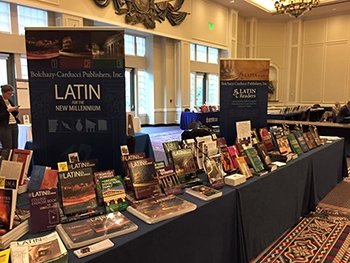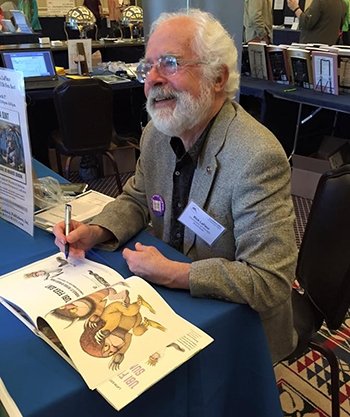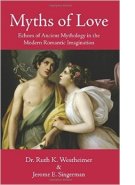Classical Conferences and Meetings in 2016
|
NB: Check www.bolchazy.com for conference presentations.
2016
CAMWS—The Classical Association of the Middle West and South
March 16–19, 2016
Williamsburg, VA
Representatives: Laurel Draper and Allan Bolchazy
Presentations:
Thursday, March 17, 2016
8:15–10:00 am
"Portrait of a Nude Woman as Cleopatra" Gregory N. Daugherty, coauthor, To Be a Roman
"Testing Tools for Ancient Greek on Digital Platforms" Wilfred E. Major, coauthor, Plato: A Transitional Reader
10:15–12 noon
"The Latin Teacher Shortage" Ronnie Ancona, author, Horace: Selected Odes and Satire 1.9 and Writing Passion: A Catullus Reader; coauthor, A Horace Workbook and Horace: A LEGAMUS Transitional Reader
1:30–3:15 pm
"The Bobbio Scholiast's Sources for his Commentary on Cicero's Speeches" Jane Crawford, coauthor, A Cicero Workbook
Friday, March 18, 2016
10:00–11:25 am
"Why is Valerius Flaccus a Quindecimvir?" Jeffrey Tatum, author, A Caesar Reader: Selections from Bellum Gallicum and Bellum Civile, and from Caesar's Letters, Speeches, and Poetry
Saturday, March 19, 2016
11:10–12:40 pm
"Intertextuality between Friends: Martial and Juvenal in Epigram 12.18" Catherine Keane, author, A Roman Verse Satire Reader: Selections from Lucilius, Horace, Persius, and Juvenal
3:45–5:30 pm
"On the Autonomy of Ovid's Tristia 5.2b" Helena R. Dettmer, coauthor, Latin for the New Millennium, Level 3; Latin for the New Millennium Latin 3: Select Latin Enrichment Readings; A Catullus Workbook
CANE—Classical Association of New England
March 18–19, 2016
Smith College
Northampton, MA
Representative: Connor Hart
51st International Congress on Medieval Studies
May 12–15, 20016
Kalamazoo, MI
Representatives: Laurel Draper and Adam Velez
ACL—American Classical League
69th Annual Institute
June 25–28, 20016
University of Texas
Austin, TX
Representatives: Allen Bolchazy, Laurel Draper, and Donald Sprague
|
|
For Teachers Only . . .
Ad Astra, chalked on the daily beer specials at Cooper's in Chicago, IL, caught this Latinist's eye.
Seen in Rome
The camera could be going non-stop while visiting Rome but when you’re leading a group of students your time to snap is limited. Nonetheless, I was pleased to catch the palindrome and the catchily-named restaurant!
The Importance of Classical Language
Thanks to the Department of Classics at the University of Otago in New Zealand for making sure that Tom Hiddleston's , of Avengers fame, discussion of the importance of classical language with Stephen Colbert went viral.
|
|
eLitterae Subscribers Special Discount
|
Special 31% Discount
Purchase up to five (5) copies of
This offer is valid for up to (5) copies, prepaid, no returns. Discount is not available to distributors or
on products distributed by Bolchazy-Carducci Publishers.
This offer expires 05/31/16.
(Please note that there will be no adjustments on previous purchases.
Offer is non-transferable and subject to change without notice.)
Enter coupon code eLit0416 on the payment page. The special eLitterae offer pricing will be charged at checkout.
|
|
Kudos to Barry Straus, Bryce and Edith M. Bowmar Professor in Humanistic Studies and Department of History Chair, Cornell University, New York, for presenting a terrific webinar March 15th entitled "The Death of Caesar." The paperback edition of his book The Death of Caesar debuted that day. Professor Strauss graciously declined an honorarium for his webinar and suggested that instead we distribute some copies of his book. Following the webinar, we drew the names of those attending the webinar and sent twelve lucky individuals a copy of Strauss's book.
Marie Bolchazy reviewed The Death of Caesar in her column "Book Buzz" in the May/June 2015 issue of eLitterae.
|
|
Next webinar series TBA, watch Facebook, Twitter, and eLitterae for the announcement.
What Equipment Do I Need for B-C Webinars?
To participate in Bolchazy-Carducci Publisher sponsored webinars you will need high-speed internet access, computer speakers/headphones, current web browser, and the link to the webinar virtual meeting space, which is provided in your webinar invitation.
Webinars Make for User-Friendly Professional Development
Participation is free. All webinars provide opportunity for participants to ask questions. Learn lots—attend as many presentations as you can. Bolchazy-Carducci Publishers provides documentation for your participation. You can share this with your supervisors. Many webinar presenters provide handouts, etc.
|
|
Bolchazy-Carducci Publishers provides eTextbooks on a variety of eBook platforms. Bolchazy-Carducci textbooks are available through VitalSource, GooglePlay, Chegg, Copia, RedShelf, Adams Book, Follett, MBSDirect Digital, and ESCO. Each eBook platform offers a variety of tools to enhance the learning process. eBooks have the same content as our traditional books in print.
eBooks are purchased from the eBook provider. For direct links to purchase Bolchazy-Carducci eTextbooks, visit the title's product page on Bolchazy.com. Just above the product description there is a list of the eTextbook providers and a direct link to purchase the eTextbook. Some eBook providers sell directly to schools—check with your school to make these purchases.
You can read eBooks on a Mac, PC, iPhone, iPad, Android, or a variety of eReaders. Review the eBook providers specifications.
|
|
The eyeVocab software leverages human memory for distinctive affective images* presented in isolation to radically improve the speed, depth, and permanence of second language vocabulary acquisition. Images are drawn from classical art, both western and eastern, from photojournalism and historical photography, great book illustration, and other sources.
*Learn how images are chosen.
Far more than a set of electronic flashcards, the multimodal vocabulary program facilitates a significantly deeper learning and retention. Students will readily master the frequent Vergil and Caesar vocabulary for the AP® Latin Exam and thereby devote far more of their study time and energy to reading and discussing De Bello Gallico and the Aeneid.
eyeVocab programs correspond to the following B-C books.
Caesar: Selections from his Commentarii De Bello Gallico
(Mueller)
(218 words)
Vergil’s Aeneid: Selected Readings from Books 1, 2, 4, and 6
(Boyd)
(162 words)
Vergil’s Aeneid: Books I–VI
(Pharr)
(292 words)
Latin for the New Millennium Level 1
(423 words)
(329 words)
Introductory rate for each of the AP® Latin programs is $14.95. The LNM 1 and LNM 2 introductory rate is $24.95 per program. For site licenses, contact Miles Becker at sales@eyeVocab.com.
Click on each title to learn more.
|
|
The Pompeiiana Newsletter created and edited by Bernard Barcio ran from 1974 through 2003. The newsletter offered a place for Latin students to publish comics, stories, games, and articles, and was a beloved resource for Latin teachers. In 2008, Barcio granted Bolchazy-Carducci Publishers the rights for all of the Pompeiiana Newsletter. B-C is proud to serve as curator for this archive and has made the issues available for teachers, students, and friends of the classics. Check out http://pompeiiana.blogspot.com/
|
|
Each fall, Bolchazy-Carducci mails its Roman Calendar to Latin teachers across the nation. Folks on that mailing list should have received their copy by now. The calendar is also available in a digital format.
|
|
Preview Bolchazy-Carducci Titles
Preview Bolchazy-Carducci titles before you purchase using Google Preview.
Downloadable Products
iPodius - Bolchazy-Carducci Publishers online shop for: audio, software, video, and a treasure trove of teacher-created materials in the Agora.
BCP Facebook Fan Page
Become a FAN of Bolchazy-Carducci Publishers, visit our Facebook Fan page for the latest news from BCP.
BCP Blog
Visit the BCPublishers Blog for BCP news and information.
Check out the Halloween costume contest winners.
BCPublishers on Twitter
Follow us on Twitter
AP® is a trademark registered and/or owned by the College Board, which was not involved in the production of, and does not endorse, this site.
These products have been developed independently from and are not endorsed by the International Baccalaureate (IB).
|
|
|
|
Spring Greetings!It's always busy at Bolchazy-Carducci Publishers! Over the course of the past year, we've prepared materials and correlations for state adoptions in South Carolina, Oklahoma, and Georgia. All three states approved Latin for the New Millennium for adoption. The Texas state adoption has most recently kept us busy not only creating the necessary materials but also uploading them in various formats. And, of course, we're constantly working on new book projects—have you checked out Latina Mythica II: Troia Capta? If not, consider getting five copies for your classroom resource shelf for students who want to read more about the Trojan War in Latin. It's this month’s discount special. Of course, it is also a great reader after students have done their grammar foundation and in preparation for later reading the Aeneid.While working away, we've wondered like many of our readers across the country, when is Spring coming? The weather in Chicagoland has been wildly erratic. Note the photos below taken April 9th and then again on the 11th. The temperature has been changing by as many as 40 degrees! It's Chicago weather!

Classics teachers, I've found, come equipped with a special ear for such things as chiasmus. For example, at a funeral the other day, the eulogist praised the deceased for inspiring a daughter and a grandson to become teachers who were true educators, teachers who recognized that "students don't care about what you know until they know that you care." In my experience, teachers of Latin and Greek are a special breed who readily put such a chiastic notion into action. The following day, another wonderful chiasm from Harry S. Truman popped up in my Facebook feed—"Not all readers are leaders, but all leaders are readers." We classics teachers know that well and successfully promote that advice with our students.
As Spring arrives, it is our wish here at Bolchazy-Carducci Publishers that your love for your students and your love for your subject bear great fruit as the school year winds its way to finals, AP and IB Latin exams, registrations for next year, college acceptances, and honors convocations.
All best from Mundelein,
Don Sprague
Editor
|
|
The 110th Annual Meeting of CANE held March 18–19, 2016, at Smith College in Northampton, MA, drew some 200 enthusiastic classicists. For fellow classicist Connor Hart, B-C social media and editorial assistant representing B-C at the conference, this was a homecoming as he is a Northampton native.
A vintage postcard of Seelye Hall, Smith College. Public Domain.
B-C filled five tables in a large classroom at the front-right of Seelye Hall, with a standing B-C banner facing the hallway. Other exhibitors set up shop throughout the first floor of the hall. A steady stream of CANE attendees kept Connor hopping as they peppered him with questions and made purchases. Several people stopped by and asked about Don and envied the news that he was unfortunately in Italy and could not attend the conference.
|
|
The 112th Annual Meeting of CAMWS took place March 16–19, 2016, in Williamsburg, VA, at the Williamsburg Lodge, at the invitation of The College of William and Mary. B-C representatives Allan Bolchazy and editor Laurel Draper flew to Richmond, VA, on Wednesday morning. They were coincidentally joined by Helena Dettmer, a classicist at the University of Iowa who has served as a B-C author and editor, and by Will Duffy, a former summer intern at B-C, who was taking the long route from San Antonio, where he teaches classics at the University of Texas at San Antonio, to Richmond via Chicago.
The Williamsburg Lodge, located in Colonial Williamsburg, is a cluster of buildings, with the conference center, reception area, and restaurants in the center, and a number of guest houses surrounding the central building. Most of the presentations, the registration, and the book exhibit room were on the lower level, with the book exhibit room at the far end. The room was spacious and had doors opening onto a beautifully landscaped area. B-C's six tables enjoyed a location front and almost center, adjacent to the refreshment tables.
 The B-C book exhibit invites attendees to check out the offerings.Rick LaFleur, emeritus professor from the University of Georgia, was on hand to sign copies of Ubi Fera Sunt, his translation of Where the Wild Things Are. We originally planned for him to sign books during the two breaks on Thursday. He also decided to sign during the Friday morning break. While we thought he would spend half an hour or so each time, he ended up spending about seven or eight hours in total at the booth. Rick took delight in not only signing the books, but offering teaching tips, alerting customers to the additional digital resources for the book on the B-C website, and getting to know each individual who requested his signature. On Friday, his wife Alice and dog Ipsa also joined us. Rick signed the copies that did not sell and B-C will bring them to the ACL Institute in June.  Doctor Illa Flora autographing away!The B-C book drawing for CAMWS attendees consisted of two bundles of books: the Annotated Collection, which was won by Jane Crawford, University of Virginia professor and one of our authors, and a bundle of new books, which included Latin of New Spain, Lucretius: The Nature of the Universe, and Latina Mythica II, which was won by Daylin Oakes, a graduate assistant at the University of Arizona.
Many people stopped by to ask about the whereabouts of Marie, Don, and Bridget. When told Marie was taking some time off, but is still healthy and active, the common response was that she has earned it. People were delighted to hear about Alexandra, Bridget's new addition to her family. And many were jealous of Don's trip to Italy—he was guiding a group of high schoolers through Rome.
This year, James May and Anne Groton, of St. Olaf College and authors of B-C's Thirty-eight Latin Stories, won the Ladislaus J. Bolchazy Pedagogy Book Award for their book 46 Stories in Classical Greek. Oxford's book Ovid: Ars Amatoria also won the award. Allan Bolchazy joined Helena Dettmer at the podium at the Business Meeting presentation of the awards. The Annotated Collection
Laurel and Allan attended the banquet. Herb Benario, emeritus professor at Emory University, indicated that he, up to the 2016 banquet, held the record for delivering the most Ovationes. James May took over the distinction of record holder with his declamations at the 2016 banquet.
The meeting enjoyed record attendance with 709 registrants, which far eclipsed the 500 and some attendees of the second highest attended meeting. The next annual meeting will be held in Kitchener, Ontario, Canada at the invitation of the University of Waterloo, April 5–8, 2017.
|
|
 This month, I'm writing about a website that I recently learned about called H5P.org. At first glance, I found it to be a little confusing because I was not really sure where to begin. However, I'm really glad that I spent a few minutes checking it out because it has much to offer. H5P.org allows the user to create a variety of online activities that can be embedded into a website or LMS such as Moodle, Canvas, Blackboard Learn and Schoology. At the top of the page, there is a link called "Downloads and Examples." I spent a few minutes in this section of the site exploring. They have good sample activities on their website so you can really see what each activity type is all about. A few types of activities caught my attention right away. With "fill in the blanks" and "drag the words" you can create a simple cloze activity with differing levels of support. The "image hotspots" activity allows the teacher to upload an image then enrich the image with text pop-up and links. To try this out, I uploaded a simple map of a Roman domus and then added pop-up descriptions of each room, some of which included pictures of examples and external links. I thought that this would be a nice way to introduce the vocabulary of the parts of the house. Another example that I liked was the "mark the words" activity. I could see using this to practice identification of specific forms of words in a text. In order to start creating activities, you have to set up a free account and then click on "my account" and "content" to access the option to build an activity. Give it a try at www.H5P.org
Lynne West
Fulbright Scholar
University of Groningen, The Netherlands
(on sabbatical from Bellarmine College Prep, San Jose, CA)
|
|
Resources & Teaching Tips
|
√ Resolution for 2016–2017
We will participate in Martia Dementia!
 Martia Dementia 2016 Martia Dementia 2016
The path to victory appeared to be wide open. Augustus crushed his competition like bricks and left marble in his wake. Last year's finalists, Lucan and returning champion Euclid, both fell in the second round, and having delivered a decisive blow to Alexander the Great, victory seemed imminent for the emperor. But Augustus underestimated the epic bard, Homer. Homer, who delivered to the world the epics the Iliad and the Odyssey. Homer, who, as a 5 Seed, rolled over the likes of Sophocles and Plutarch, and just as easily beat Hesiod and Ovid. Homer beat Augustus 157–4 to win the 2016 Martia Dementia competition. Much like last year, many narratives came out of the bracket as voting created conflict among these authors, philosophers, and political figures, and there was plenty of opportunity for others; imagine if Ovid had beat Homer and was given the opportunity for vengeance? These narratives and the success of Martia Dementia happened all thanks to our participants.
The response to Martia Dementia was again overwhelming, building off last year's success. I would like to thank all the teachers, professors, friends, students, and everyone I may have left out for their participation. I would also like to take time to acknowledge and congratulate the following for their success in this year's competition. First, to Ryan Schumacher of the Bullis School, who only had two picks in the Sweet Sixteen, I say congratulations for having the most abysmal bracket! To Derrick Thomas III, also of the Bullis School, who, with only one correct pick in the Final Four, still managed to pick up 43 points, I would also like to say congratulations for taking third place! To Ruth Loop of the Thomas Dale High School, who managed to slip into second place with 44 points despite having one finalist, Augustus, going no further than the Sweet Sixteen, I would like to say congratulations for finishing in second place! Lastly, I congratulate the Brookfield Academy Upper School, sponsored by their teacher Ruth Osier, who, having 75% of the Final Four correct and nothing but right picks from there, won this year's Martia Dementia! Take a look at the winning bracket!
Looking forward to next year's Martia Dementia? Already counting down the days? Want to see an author, politician or philosopher who did not make it into this year's bracket? Would you rather see gods and goddesses versus heroes versus beasts? Tweet @BCPublishers what and who you would like to see, and include the hash tag #MartiaDementia. And be sure not to miss any news and updates by following us on social media if you don’t already!
Connor Hart
Social Media and Editorial Assistant
√ A Teacher's Exemplary Game Plan for Employing Martia Dementia in the Classroom
Last year we learned about Martia Dementia and although I spoke to my classes about it there wasn't much interest. This year several basketball students were very amused by the idea of Greeks and Romans facing off. Heated debates began on "Vergil vs. Plautus" or "Pompey vs. Trajan." Since there was such controversy, I instructed the debaters to fill out brackets and I would take the most common threads and send a copy to enter in the contest. Around a dozen students turned in forms to me. Once the final collation was submitted, copies of our bracket were distributed to all students with an explanation of how to vote. Then we left on spring break and I assumed the students would forget to vote and it would end then. But when we returned they were excited that most (not all) of their picks were still in the running. As each round concluded and voting began again, I allowed the students to have a couple minutes at the beginning of class that day to vote. When we arrived at the final four the students started to get friends and relatives to vote. At the end of the tournament, every day the students asked if I had heard if we won because our choices seemed to move on at every level. When I was able to announce "Victoria est nobis!" cheers broke out. The students enjoyed the fun of the competition and I enjoyed introducing names and history lessons to the students who didn't know all the "teams."
Ruth Osier
Brookfield Academy Upper School
Brookfield, WI
√ The ACTFL Teacher of the Year
Ed Zarrow delivers his acceptance speech at ACTFL 2015 in San Diego.
An ACTFL interview with Latin Teacher Ed Zarrow of Westwood High School, Massachusetts provides insights into Latin pedagogy, comprehensive input, using oral Latin, and how Latin can meet ACTFL's "World Readiness" standards.
√ Timotheos's "Younger Zeus"
Gratias to my colleague, managing editor Bridget Dean, who suggested we share an interesting blog with you. And, we encourage you to share it with your students.
John Warden, Emeritus Professor of Classics, the University of Toronto, has written an imaginary series of blogs written by the poet and Citharode Timotheos, who lived through the Golden Age of Athens.
It is a jeu d'esprit, but at the same time has some serious content, offering a somewhat radical perspective on that period. It concludes with a translation of Timotheos's major surviving fragment, The Persians.
Dr. Dean recommends the blog as an interesting way to discuss genre writing/genre creation. It would also pair well with a discussion and study of Athens and Greek democracy. And, it would serve quite nicely as a special class or extra credit project.
While the vast majority of extant images of Zeus depict him as a mature adult, a few like Jordaens's Education of Jupiter portray him as a youth—alas, younger than the "Younger Zeus." Public Domain.
√ Seamus Heaney Redux
Last issue we provided a link to The Guardian coverage of the release of Heaney's translation of Aeneid 6. One needs a subscription to read the full Financial Times version, however, the excerpt below sent by our freelance editor Laurie Keenan brings a smile to the Latin teacher's eye. Also, check out The Irish Times report and NPR's Ari Shapiro talking to poetry critic Tess Taylor about the translation.
Heaney's translator's note calls what he has done "neither a 'version' nor a crib, more like classics homework, the result of a life-long desire to honour the memory of my Latin teacher, Father Michael McGlinchey." His teacher "created an inner literalist who still hunts for the main verb of a sentence and still, to the best of his ability, disentangles the subordinate clauses, although usually nowadays with the help of a crib from the Loeb Library".
Ruth Padel, "Beyond the golden bough with Seamus Heaney," Financial Times, March 24, 2016
√ Rick LaFleur on Myth, Etymology, and Classical Varia
Professor LaFleur contributes a regular column to the weekly newspaper The Apalachicola & Carrabelle Times. Check out this one "Toasting Canines, Cats, and Cleopatra." You can then "follow" Rick and his engaging collations.
√ Spectacular Roman Villa
A homeowner in England accidentally discovers the remains of a beautiful mosaic and what would have been a three-story villa
√ Digital Roman Atlas
Make sure have this indispensable resource bookmarked!
√ The Atlantic Explores
The Atlantic finds the roots of social media in Pompeii’s graffiti and explores the less-than sanitary world of Roman toilets.
√ The Smithsonian: Etruscan Language Unlocked?
√ Teacher Reading
- Robert Connor explains five ways to explain the value of the humanities.
- And, here’s a compelling practical reason. Classicists and the LSAT—Venerunt, Legerunt, Vincerunt!
- PBS explores what we classicists always knew—Latin helps build English vocabulary!
- Upon retirement author takes up Latin at age 60 and delineates 40 reasons for doing so.
- Consider the value of practicing “flexible thinking” with your Latin and Greek students.
√ The Ds Commentary on Books
B-C is pleased to recommend the academic bulletin The Ds Commentary on Books. Join more than 3,000 Biblicists, Classicists, and Near Eastern specialists who enjoy the bulletin’s in-depth reviews of new titles in the field. To subscribe, contact dssemitica@hotmail.com. |
|
 Myths of Love: Echoes of Ancient Mythology in the Modern Romantic Imagination Myths of Love: Echoes of Ancient Mythology in the Modern Romantic Imagination
Classicist Jerome E. Singerman selected the ancient myths, in particular those of Ovid; and sex expert Dr. Ruth retold the stories and reflected on what they mean in contemporary times. The book is filled with references to poets, playwrights, and historians who were inspired by these myths. For example, William Butler Yeats, cited in the "Leda and the Swan" chapter, wrote "And how can body, laid in that white rush/ But feel the strange heart beating where it lies?" Euripides had his Helen of Troy character speak the words, "And so my life is monstrous, and . . . my beauty is to blame. I wish that like a picture I had been rubbed out and done again, made plain, without this loveliness." In the Metamorphoses, Ovid has his Narcissus character say "I am he. I sense it and I am not deceived by my own image. I am burning with love for myself. I move and bear the flames."
Some of the highlighted themes are
• thwarted incestuous passion
• the role of trust in love and commitment
• rape and its outcomes
• lust and vanity and the destruction they can bring
• the burden of war widows
• female domination versus emasculation
• destructiveness of narcissistic love
• the fluidity of gender traits between men and women
• purity in sexual pleasure
• love among equals
• objectification versus loving a true person
• star-crossed lovers, descent into the underworld
• selfishness in marriage
• mature and committed love
The ancient gave us several accounts of how Tiresias became blind. In one of them, he was changed from a man to a woman and back to a man again, and while he was a woman, he was a prostitute. In this account, Hera was outraged and struck him blind because he claimed that women had more sexual enjoyment than men. Dr. Ruth noted that this myth makes sense only in a culture that is ashamed of female sexuality.
In the "Phaedra and Hippolytus" chapter, the authors explore the idea of passion between an older woman with her stepson and cite the stories of such liaisons written by Euripides, Seneca, Ovid, and Eugene O'Neill (Desire Under the Elms), and others; all of whom were influenced by the Greek and Roman myth. Dr. Ruth comments that such love is sweet and bitter at once; but in this Greek and Roman myth, it is the bitterness that prevails.
The story of Cupid and Psyche is arguably the most erotic of the myths in this collection. Two beautiful young lovers make love in the dark and come to know each other by touch only. But it is not enough for Psyche—she has to see her lover in the light. According to Dr. Ruth, only then can her passion mature into love.
Personally, I was not familiar with the myth of Acontius and Cydippe, which in some ways resembles a modern romantic comedy. But I liked the charm of the story. Acontius, who fell in love with Cydippe at first sight, tricks her into uttering the oath, "I swear by the sanctuary of Diana to marry Acontius." Of course, once she has uttered the oath, it must be fulfilled. Dr. Ruth commented that this myth reminded her of a Hepburn and Tracy film.
The last myth in the book is that of Baucis and Philemon, the loving married couple who, though they had very little, shared their food with strangers who turned out to be gods. Philemon’s request of these gods was that he and his wife die at the same hour. When their time to die arrived, they were turned into trees with their branches entwined. Dr. Ruth noted that this myth reminded her of a comment made by a friend that there can be no good end to a good marriage. She ends the book by commenting that the myth of Baucis and Philemon demonstrates otherwise—a good way to end Myths of Love.
Marie Carducci Bolchazy, EdD
President, Bolchazy-Carducci Publishers
|
|
|